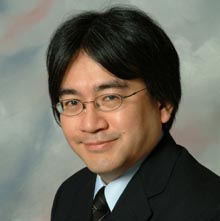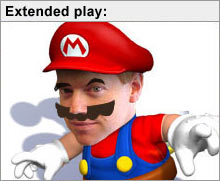Nintendo president vows cheap games
Iwata discusses price hikes and ways to keep costs down as gaming enters the next generation.
NEW YORK (CNNMoney.com) � Nintendo has already vowed its next generation console will be cheaper than its competitors. Now it's making the same promise about its games. Satoru Iwata, president of Nintendo of Japan, told me last week that while the company has no control over what its partners ask for their games, "I cannot imagine any first party title could be priced for more than $50."
Development costs in the next generation have been one of the talking points for Nintendo for several months. The company has repeatedly said flashier graphics on the same games will only drive up costs, not increase the industry's appeal. Third party publishers are hoping otherwise, as games for the Xbox 360 (and, if pricing goes as expected, for the PlayStation 3) regularly hover in the $60 range. "In the US, we're going to see the next generation cost an awful lot," said Iwata. "I really don't think that there's going to be a lot of acceptance by current customers of the $60 price tag. They may allow that for a limited number of premium titles, but not all." Microsoft (Research) and Sony (Research) hope to supplement their income with digital distribution, selling games and more via their online services. Xbox 360 owners are able to download new, small games onto their hard drive for a small fee (typically no more than $10). The model will likely be the same with the PS3. The Revolution won't have a hard drive, though, raising questions about where owners will be able to store games obtained from the system's "Virtual Console" (a service that will allow them to download virtually every game for previous Nintendo home systems, as well as select titles from the Sega Genesis and TurboGrafx systems). Again, Iwata said this will be a topic addressed at E3, though he did offer some insight. The Revolution has 512 MB of flash memory, allowing for some initial storage space. The system also has a slot for SD memory cards, which are widely used in digital cameras and can hold a greater amount of data. Most importantly, Iwata mentioned, were the USB ports that are built into the Revolution "so practically any storage method can be used". It's entirely possible that some downloads might not be permanent, either, making additional storage space less important. "We can set some limitations as to the time period a piece of downloaded content can be played," said Iwata. "Or, we may opt to let users play as long as they want. This gives us a flexible business model." That could hold appeal to other publishers. Last week, Nintendo announced a partnership arrangement with Sega and Hudson Software to offer some of their games via the Virtual Console. Later, Iwata hinted more announcements might be coming � though he wasn't willing to discuss this too thoroughly. "A number of different publishers are now interested in participating in this virtual console system," he said. "As far as the details, though, I believe we will wait for another opportunity before discussing them." While the Virtual Console's focus so far has been on classic games, Iwata said Nintendo fully plans to use it for new titles as well. The company plans to encourage developers to take risks in the next generation, challenging them to use the Revolution's unique features to make smaller games anyone can pick up and enjoy. And Iwata said Nintendo (Research) will lead the charge in developing and distributing these sorts of games. "If we can come up with an addictive, but simple title � such as Tetris 15 years ago � my attention should be focused on containing costs," he said. "So, I would make it available through the Virtual Console. I think the opportunity for ourselves will be much larger than software that costs $50-$60. ... Of course, there are a number of people waiting for a 'masterpiece' title. For those games, we'll utilized traditional distribution channels." One other way publishers are trying to control costs these days is by including advertising in games. It's a controversial move, one that has riled many core gamers. Iwata said he has tracked the trend, but admits it confuses him somewhat. Players, he said, don't have time to pay attention to the ads as they work their way through the game world. As such, he doesn't see the business sense for advertisers � and believes the trend will not be a long lasting one. "We do not deny the possibility that Nintendo will be doing something like this in the future," he said. "Personally, though, I don't really think it's going to be a significant source of revenue to our industry." What's it like to use the Revolution's controller? Read our hands-on account
Morris is Director of Content Development for CNNMoney.com. Click here to send him an email. |
| ||||||||||||||||



